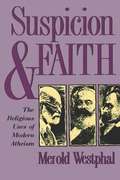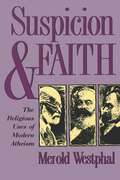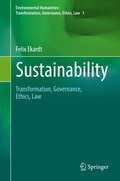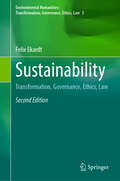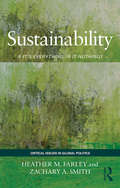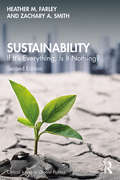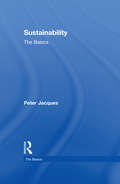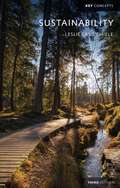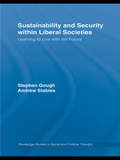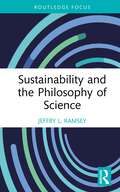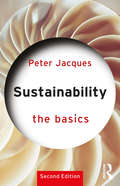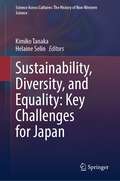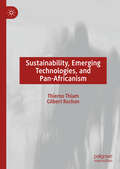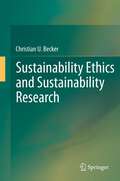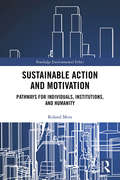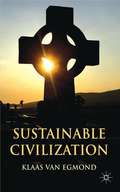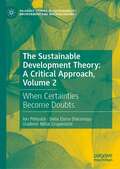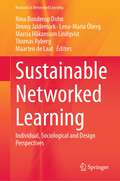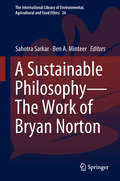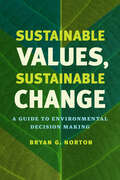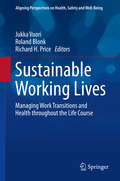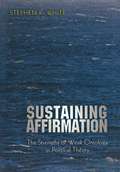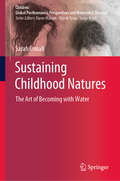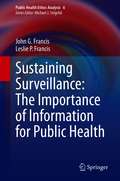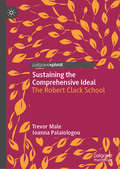- Table View
- List View
Suspicion and Faith: The Religious Uses of Modern Atheism
by Merold WestphalMarx, Nietzche, and Freud are among the most influential of modern atheists. The distinctive feature of their challenge to theistic and specifically Christian belief is expressed by Paul Ricoeur when he calls them the "masters of suspicion." While skepticism directs its critique to the truth or evidential basis of belief, suspicion asks two different, intimately intertwined questions: what are the motives that lead to this belief? and what function does it play, what work does it do for the individuals and communities that adopt it. <P><P>What suspicion suspects is that the survival value of religious beliefs depends on satisfying desires and interests that the believing soul and the believing community are not eager to acknowledge because they violate the values they profess, as when, for example, talk about justice is a mask for deep-seated resentment and the desire for revenge. For this reason, the hermeneutics of suspicion is a theory, or group of theories, of self-deception: ideology critique in Marx, genealogy in Nietzsche, and psychoanalysis in Freud. <P><P>Suspicion and Faith argues that the appropriate religious response ("the religious uses of modern atheism") to these critiques is not to try to refute or deflect them, but rather to acknowledge their force in a process of self-examination--and this for two reasons. First, while these critiques are not, as Marx, Nietzsche, and Freud tend to suppose.
Suspicion and Faith: The Religious Uses of Modern Atheism
by Merold WestphalAvailable in a new digital edition with reflowable text suitable for e-readersMarx, Nietzche, and Freud are among the most influential of modern atheists. The distinctive feature of their challenge to theistic and specifically Christian belief is expressed by Paul Ricoeur when he calls them the "masters of suspicion." While skepticism directs its critique to the truth or evidential basis of belief, suspicion asks two different, intimately intertwined questions: what are the motives that lead to this belief? and what function does it play, what work does it do for the individuals and communities that adopt it.What suspicion suspects is that the survival value of religious beliefs depends on satisfying desires and interests that the believing soul and the believing community are not eager to acknowledge because they violate the values they profess, as when, for example, talk about justice is a mask for deep-seated resentment and the desire for revenge. For this reason, the hermeneutics of suspicion is a theory, or group of theories, of self-deception: ideology critique in Marx, genealogy in Nietzsche, and psychoanalysis in Freud.Suspicion and Faith argues that the appropriate religious response ("the religious uses of modern atheism") to these critiques is not to try to refute or deflect them, but rather to acknowledge their force in a process of self-examination.
Sustainability: Transformation, Governance, Ethics, Law (Environmental Humanities: Transformation, Governance, Ethics, Law)
by Felix EkardtThis book proposes a holistic transdisciplinary approach to sustainability as a subject of social sciences. At the same time, this approach shows new ways, as perspectives of philosophy, political science, law, economics, sociology, cultural studies and others are here no longer regarded separately. Instead, integrated perspectives on the key issues are carved out: Perspectives on conditions of transformation to sustainability, on key instruments and the normative questions. This allows for a concise answer to urgent and controversial questions such as the following: Is the EU an environmental pioneer? Is it possible to achieve sustainability by purely technical means? If not: will that mean to end of the growth society? How to deal with the follow-up problems? How will societal change be successful? Are political power and capitalism the main barriers to sustainability? What is the role of emotions and conceptions of normality in the transformation process? To which degree are rebound and shifting effects the reason why sustainability politics fail? How much climate protection can be claimed ethically and legally e.g. on grounds of human rights? And what is freedom? Despite all rhetoric, the weak transition in energy, climate, agriculture and conservation serves as key example in this book. It is shown how the Paris Agreement is weak with regard to details and at the same time overrules the growth society by means of a radical 1,5-1,8 degrees temperature limit. It is shown how emissions trading must – and can – be reformed radically. It is shown why CSR, education, cooperation and happiness research are overrated. And we will see what an integrated politics on climate, biodiversity, nitrogen and soil might look like.
Sustainability: Transformation, Governance, Ethics, Law (Environmental Humanities: Transformation, Governance, Ethics, Law #5)
by Felix EkardtThis book proposes a holistic transdisciplinary approach to sustainability and post-fossil societies as a subject of social sciences - at a time when post-fossilisation is becoming a core political concern due to the aggressive foreign policy of autocracies, also for reasons beyond sustainability. Furthermore, the book shows new ways, as perspectives of philosophy, political science, law, economics, sociology, cultural studies and others are here no longer regarded separately. Instead, integrated perspectives on the key issues are carved out: Perspectives on conditions of transformation to sustainability, on key instruments and the normative questions. This allows for a concise answer to urgent and controversial questions such as the following: Is the EU an environmental pioneer? Is it possible to achieve sustainability by purely technical means? If not: will that mean to end of the growth society? How to deal with the follow-up problems? How will societal change be successful? Are political power and capitalism the main barriers to sustainability? What is the role of emotions and conceptions of normality in the transformation process? To which degree are rebound and shifting effects the reason why sustainability politics fail? How much climate protection can be claimed ethically and legally e.g. on grounds of human rights? And what is freedom? Despite all rhetoric, the weak transition in energy, climate, agriculture and conservation serves as key example in this book. It is shown how the Paris Agreement is weak with regard to details and at the same time overrules the growth society by means of a radical 1,5 degrees temperature limit. It is shown how emissions trading must – and can – be reformed radically. It is shown why CSR, education, cooperation and happiness research are overrated. And we will see what an integrated politics on climate, biodiversity, nitrogen and soil might look like. This book deals with conditions of transformation, governance instruments, ethics and law of sustainability. The relevance of the humanities to sustainability has never before been demonstrated so vividly and broadly as here. And in every area it opens up some completely new perspectives.
Sustainability: If It's Everything, Is It Nothing?
by Heather M. Farley Zachary A. SmithHumans are not living within our ecological means. We are using the earth’s resources at a pace that cannot be maintained. We have already seen evidence of the fallout associated with ecological overconsumption and continued abuse of environmental systems will create increasing challenges both today and into the future. Our depletion of natural systems minimizes the possibilities available to future generations who are expected to somehow rely on innovation and ingenuity for their survival. Yet, despite the challenges we face, governments, individuals, non-profits, educational institutions, and corporations are all heralding the promise of sustainable development to save our environmental systems from collapse while allowing for uninterrupted economic growth. Today, the concept of sustainability is a widespread goal that nearly everyone supports. At the same time, almost no one means the same thing when they use the term. Sustainability is so broad and overly used that it seems to mean everything to everyone. The result is that the concept has lost its meaning. In this book, the authors examine the misuses and abuses of "sustainability" and seek to refine and clarify the concept. The authors offer a new definition of sustainability – what they call neo-sustainability – to help guide policies and practices that respect the primacy of the environment, the natural limits of the environment, and the relationship between environmental, social, and economic systems.
Sustainability: If It's Everything, Is It Nothing? (Critical Issues in Global Politics)
by Heather M. Farley Zachary A. SmithIn this second edition, the authors present new developments in the sustainability discussion and argue that a new understanding of sustainability is needed if we are to truly serve future generations ecologically, economically, and equitably. Despite the great flurry of activity around sustainability, the concept itself remains highly contested. This book argues that a new conceptualization of sustainability is needed if we are to achieve a healthful and sustainable environment for the long term. The authors examine the uses, misuses, and abuses of sustainability, and provide case studies of faux-sustainability in practice. Seeking to redefine and clarify the concept and its application, they offer a new definition of sustainability – what they call neo-sustainability – to help guide policies and practices that respect the primacy of the environment, the natural limits of the environment, and the relationship between environmental, social, and economic systems. Offering a comprehensive view of sustainability, this text is essential reading for all students and scholars in the field. It will also be of interest to environmental professionals and activists.
Sustainability: The Basics (The Basics)
by Peter JacquesSustainability is concerned with the issues around the ongoing and mutual preservation of both society and the environment. It is a widely used term and supposed goal for many governments but it is also easily misunderstood. Sustainability: The Basics offers an accessible and interdisciplinary introduction to the concept, and discusses key questions such as: How do we decide who or what should be sustained? How can we ensure that the world’s resources are distributed fairly? What lessons can we learn from the collapse of previous civilizations? Sustainability studies is in a position to ask some of the most interesting questions about human purpose, identity, modernity, ethics, and the nature of "progress". This book is an ideal starting point for anyone who wants to know more about we can ‘hold up’ civilization, humanity, and the world we live in.
Sustainability (Key Concepts)
by Leslie Paul ThieleThe quest for sustainability has generated lifestyle changes for individuals across the globe, transformations within the arts, sciences, business, design, engineering, and agriculture, innovative policies and laws, and historic international agreements. Yet the means to achieving sustainability remain unsettled and disputed, even as its crucial importance in the face of the climate crisis grows. The third edition of this popular and lively text explores the concept and practice of sustainability across a broad range of issues and topics. Fully revised and updated, the book underlines the importance of creativity in the service of conservation within ecological, economic, technological, political, legal, and cultural arenas. Chapters conclude with new Discuss, Explore, and Take Action sections that pose probing questions for review and discussion. A new final chapter presents four practical principles that readers may employ to guide the investigation of sustainability problems and their crafting of viable solutions. Sustainability presents a hopeful account of the opportunities before us while squarely confronting the daunting challenges that lie ahead. It provides a crucial resource for students grappling with many of the most urgent issues of our time.
Sustainability and Security within Liberal Societies: Learning to Live with the Future (Routledge Studies in Social and Political Thought #Vol. 58)
by Stephen Gough Andrew StablesMuch of the world will be living in broadly "liberal" societies for the foreseeable future. Sustainability and security, however defined, must therefore be considered in the context of such societies, yet there is very little significant literature that does so. Indeed, much ecologically-oriented literature is overtly anti-liberal, as have been some recent responses to security concerns. This book explores the implications for sustainability and security of a range of intellectual perspectives on liberalism, such as those offered by John Rawls, Robert Nozick, Frederick Hayek, Ronald Dworkin, Michael Oakeshott, Amartya Sen and Jürgen Habermas.
Sustainability and the Philosophy of Science (Routledge Focus on Environment and Sustainability)
by Jeffry L. RamseyThis book demonstrates how the philosophy of science can enhance our understanding of sustainability and the practices we use to enact it. Examining assumptions about concepts, theories, evidence, and the moral ideals of sustainability can better orient us as we pursue this urgent and important goal. The book applies perspectives and tools from the philosophy of science – construed broadly to include portions of science and technology studies, history of science, and philosophy more generally – to sustainability discourse. It argues that widely held assumptions regarding the meaning of concepts, methods of theorizing and inferential practice, evidential structure, and ethics limit our understanding and practice of sustainability. It offers philosophical alternatives that capture more fully the confusing, wicked nature of sustainability challenges. The alternatives draw attention to existing but often undervalued frameworks in sustainability discourse. This book is aimed towards academics, researchers, and post-graduates working in sustainability, as well as philosophers of science and environmental philosophers interested in the philosophical issues raised by the pursuit of sustainability.
Sustainability: The Basics (The Basics)
by Peter JacquesSustainability is a pressing concern for people and governments around the world, but it is also an essentially contested concept that requires an understanding of the stakes, trade-offs, and complex politics at play. Sustainability: The Basics offers an accessible and interdisciplinary introduction to the concept, and discusses key questions such as: What are the core principles of sustainability? What are the key ethical considerations for questions of sustainability? How do we measure sustainability? What are the critical obstacles to achieving global sustainability? What happens when societies fail to observe principles of sustainability? Fully updated in its second edition, Sustainability: The Basics now includes coverage of the Sustainable Development Goals, a global range of case studies and explores the complex social dynamics of Earth system changes that affect our critical life supports. The second edition also proposes a new, "sustainable humanism" that animates much of our work to make a better, more humane world. As the world reels from the effects of the Covid-19 pandemic, this book is an ideal starting point for anyone who wants to know more about what we need to do to sustain civilization, humanity, and the world we live in.
Sustainability, Diversity, and Equality: Key Challenges for Japan (Science Across Cultures: The History of Non-Western Science #13)
by Kimiko Tanaka Helaine SelinThis book enables readers to understand contemporary Japanese society and culture. Since it is written by experts, it allows readers to start with any chapters they are interested in. It also provides a unique way to introduce Japanese society and culture to those who have never visited or studied Japanese society by reading articles from various authors on topics such as gender, family, economy, natural disasters and politics and laws. It provides scholars, academics, graduate students and the general educated audience all the information required to understand contemporary Japanese society and culture fully and see the diverse perspectives available.
Sustainability, Emerging Technologies, and Pan-Africanism
by Thierno Thiam Gilbert RochonThis book examines the historical antecedents of Pan-Africanism as a driving force of African Unity, carefully studying its major contributors, current institutional status, and potential future growth. It analyzes the facilitative role of emerging technologies, such as high performance computing, telecommunications, and satellite remote sensing in enabling African sustainable development. Finally, the authors discuss possible ways that the vision of Pan-Africanism can be used today in Africa’s efforts towards unity and sustainable development.
Sustainability Ethics and Sustainability Research
by Christian BeckerThe book identifies the specific ethical aspects of sustainability and develops ethical tools to analyze them. It also provides a methodological framework to integrate ethical and scientific analyses of sustainability issues, and explores the notion of a new type of self-reflective inter- and transdisciplinary sustainability research. With this, the book aims to strengthen the overall ability of academics to contribute to the analysis and solution of sustainability issues in an inclusive and integrated way.
Sustainable Action and Motivation: Pathways for Individuals, Institutions and Humanity (Routledge Environmental Ethics)
by Roland MeesSustainable Action and Motivation proposes individual competencies and institutional policies that can help overcome the motivational hurdles that hamper sustainable action. Following the Paris Agreement of 2015 and the UN Sustainable Development Goals, the political momentum urgently to begin the drastic reduction of greenhouse gas emissions has increased significantly. Affluent, high-income OECD countries are expected to take the lead in the global transition to a low carbon society. Given this, we need a better understanding of the motivational problems that people in affluent countries face with acting sustainably. This book investigates the above questions by analysing three fundamentally different perspectives: individuals and their motivation to act sustainably; institutions who take responsibility for issuing policies that steer us towards taking sustainable action; and humanity, each individual member of which ought to understand his or her non-sustainable behaviour in relation to the continued existence of the collective of human beings. Using theories from empirical psychology and a phenomenological approach to the research, this book will be of great interest to students and scholars of practical philosophy, psychology of motivation and environmental psychology, as well as policymakers looking for ways to implement effective policies that encourage pro-environmental behaviour.
Sustainable Civilization
by Klaas Van EgmondWestern civilization has entered a new fundamental crisis that can be explained by a very one-sided orientation of social values based on materialism and egocentrism, which is disrupting the delicate balance between the opposing forces of 'mind' and 'matter', and of 'I' and 'the others'. Many sources from the great works of philosophy, religion, art and culture to social surveys and the course of history qualify sustainability as the dynamic equilibrium between fundamental opposing forces. This insight and the ethical ability to better discriminate between stabilizing and destabilizing forces would allow further justification of human rights and new institutional arrangements in society at large and, in particular, in politics, economy and finance. It would enable a sustainable civilization to flourish within the boundaries of freedom and human dignity. "
The Sustainable Development Theory: When Certainties Become Doubts (Palgrave Studies in Sustainability, Environment and Macroeconomics)
by Ion Pohoaţă Delia Elena Diaconaşu Vladimir Mihai CrupenschiThis book explores the present conflictual relationship between the economy, the environment, and society. The current mainstream economic model is analysed from the perspective of the founding economists to review its suitability to tackle issues of sustainable development. The problems of redistribution and social justice are debated at length; alongside those concerning the giant state, degrowth, and a vision of sustainability that is founded on the idea of a self-regulating free market economy. Business cycle sustainability, anti-crisis therapy, technological unemployment, the natural rate of interest, and the Bruntland matrix are also examined.This book aims to present a holistic approach to sustainable development where social, ecological, and economic components are balanced. It will be relevant to students and researchers interested in this topic.
Sustainable Networked Learning: Individual, Sociological and Design Perspectives (Research in Networked Learning)
by Nina Bonderup Dohn Jimmy Jaldemark Lena-Maria Öberg Marcia Håkansson Lindqvist Thomas Ryberg Maarten De LaatThis book provides cutting-edge research on networked learning, focusing on issues of sustainability in design for learning, data use, and networked learning connections. It contributes novel theoretical perspectives on networked learning, its role in society and potential for sustainable learning design. It further contributes a set of exemplary empirical cases - exemplary in terms of their innovative learning designs, pedagogical use of technology in connecting learners, and/or critical reflections on implications of utilizing different technologies to support learning. The book is organized into four main sections: 1) Data and datafication, 2) Sustainable learning design, 3) Sociological perspectives on Networked Learning, and 4) Networked learning in times of lockdown. Concluding the book is a final chapter which points to emerging issues within the field of networked learning, based on discussion of perspectives from the chapters The book's focus on the nature of learning and technology-mediated interactions makes it of prime significance to researchers and practitioners in the field of technology-supported teaching and learning.
A Sustainable Philosophy—The Work of Bryan Norton (The International Library of Environmental, Agricultural and Food Ethics #26)
by Sahotra Sarkar Ben A. MinteerThis book provides a richly interdisciplinary assessment of the thought and work of Bryan Norton, one of most innovative and influential environmental philosophers of the past thirty years. In landmark works such as Toward Unity Among Environmentalists and Sustainability: A Philosophy of Adaptive Ecosystem Management, Norton charted a new and highly productive course for an applied environmental philosophy, one fully engaged with the natural and social sciences as well as the management professions. A Sustainable Philosophy gathers together a distinguished group of scholars and professionals from a wide array of fields (including environmental philosophy, natural resource management, environmental economics, law, and public policy) to engage Norton’s work and its legacy for our shared environmental future. A study in the power of intellectual legacy and the real-world influence of philosophy, the book will be of great interest scholars and students in environmental philosophy, public policy and management, and environmental and sustainability studies. By considering the value and impact of Norton’s body of work it will also chart a course for the next generation of pragmatic environmental philosophers and sustainability scholars grappling with questions of environmental value, knowledge, and practice in a rapidly changing world.
Sustainable Values, Sustainable Change: A Guide to Environmental Decision Making
by Bryan G. NortonSustainability is a nearly ubiquitous concept today, but can we ever imagine what it would be like for humans to live sustainably on the earth? No, says Bryan G. Norton in Sustainable Values, Sustainable Change. One of the most trafficked terms in the press, on university campuses, and in the corridors of government, sustainability has risen to prominence as a buzzword before the many parties laying claim to it have come close to agreeing how to define it. But the term's political currency urgently demands that we develop an understanding of this elusive concept. While economists, philosophers, and ecologists argue about what in nature is valuable, and why, Norton here offers an action-oriented, pragmatic response to the disconnect between public and academic discourse around sustainability. Looking to the arenas in which decisions are made--and the problems that are driving these decisions--Norton reveals that the path to sustainability cannot be guided by fixed, utopian objectives projected into the future; sustainability will instead be achieved through experimentation, incremental learning, and adaptive management. Drawing inspiration from Aldo Leopold's famed metaphor of "thinking like a mountain" for a spatially explicit, pluralistic approach to evaluating environmental change, Norton replaces theory-dependent definitions with a new decision-making process guided by deliberation and negotiation across science and philosophy, encompassing all stakeholders and activists and seeking to protect as many values as possible. Looking across scales to today's global problems, Norton urges us to learn to think like a planet.
Sustainable Working Lives
by Jukka Vuori Roland Blonk Richard H. PriceThe purpose of this volume is to describe the impact of the increased demand for flexibility on employees and its impact on their individual work life trajectories and health. The volume offers concrete examples of interventions aimed to find innovative ways of sustainable work careers for today's workers. We focus on the school to work transition, job insecurity, job loss and re-employment and retirement. The interventions described offer strategies for implementing support in employment contracts, increasing preparedness of individual employees with public education programs or developing work arrangements and support systems in work organizations.
Sustaining Affirmation: The Strengths of Weak Ontology in Political Theory
by Stephen K. WhiteIn light of many recent critiques of Western modernity and its conceptual foundations, the problem of adequately justifying our most basic moral and political values looms large. Without recourse to traditional ontological or metaphysical foundations, how can one affirm--or sustain--a commitment to fundamentals? The answer, according to Stephen White, lies in a turn to "weak" ontology, an approach that allows for ultimate commitments but at the same time acknowledges their historical, contestable character. This turn, White suggests, is already underway. His book traces its emergence in a variety of quarters in political thought today and offers a clear and compelling account of what this might mean for our late modern self-understanding.As he elaborates the idea of weak ontology and the broad criteria behind it, White shows how these are already at work in the thought of contemporary writers of seemingly very different perspectives: George Kateb, Judith Butler, Charles Taylor, and William Connolly. Among these thinkers, often thought to be at odds, he exposes the commonalities that emerge around the idea of weak ontology. In its identification of a critical turn in political theory, and its nuanced explanation of that turn, his book both demonstrates and underscores the strengths of weak ontology.
Sustaining Childhood Natures: The Art of Becoming with Water (Children: Global Posthumanist Perspectives and Materialist Theories)
by Sarah CrinallThis book examines sustainability learning with children, art and water in the new material, posthuman turn. A query into how we might sustain (our) childhood natures, the spaces between bodies and places are examined ontologically in daily conversations. Regarding philosophy, art, water and her children, the author asks, how can I sustain waterways if I am not sustaining myself?Theoretically disruptive and playful, the book introduces a new philosophy that combines existing philosophies of the new material and posthuman kind. The ecological sciences, and the arts, are drawn together / apart to help recognize sustainability in its emergent, relational form. All the while this book, as art, engages and flows over the reader – as such, reading it becomes a transformative, meditative experience. Daily rhythms of ‘being-with’ art, water and children take the reader beyond orientations of environmental education that focus on notions of lack and reduction. New possibilities for sustaining childhood natures – for what is becoming, and unbecoming – emerge here in the making processes of an academic, everyday life in early motherhood.
Sustaining Surveillance: The Importance of Information for Public Health (Public Health Ethics Analysis #6)
by John G. Francis Leslie P. FrancisThis book presents a comprehensive theory of the ethics and political philosophy of public health surveillance based on reciprocal obligations among surveillers, those under surveillance, and others potentially affected by surveillance practices. Public health surveillance aims to identify emerging health trends, population health trends, treatment efficacy, and methods of health promotion--all apparently laudatory goals. Nonetheless, as with anti-terrorism surveillance, public health surveillance raises complex questions about privacy, political liberty, and justice both of and in data use. Individuals and groups can be chilled in their personal lives, stigmatized or threatened, and used for the benefit of others when health information is wrongfully collected or used. Transparency and openness about data use, public involvement in decisions, and just distribution of the benefits of surveillance are core elements in the justification of surveillance practices. Understanding health surveillance practices, the concerns it raises, and how to respond to them is critical not only to ethical and trustworthy but also to publicly acceptable and ultimately sustainable surveillance practices. The book is of interest to scholars and practitioners of the ethics and politics of public health, bioethics, privacy and data technology, and health policy. These issues are ever more pressing in pandemic times, where misinformation can travel quickly and suspicions about disease spread, treatment efficacy, and vaccine safety can have devastating public health effects.
Sustaining the Comprehensive Ideal: The Robert Clack School
by Trevor Male Ioanna PalaiologouThis book explores the development of educational leadership within difficult contexts via the lens of a previously failing English secondary school in an area of urban poverty. Based on extensive interview data from 2012-2016, the authors demonstrate that the fundamental ethos underpinning the school’s improvement is a desire to meet the needs of young people in disadvantaged communities in order to equip them with the skills to allow them to transcend their situation. The authors posit that this school embodies the ‘comprehensive ideal’ of secondary education in England: that education should not be disadvantaged by background, and that the state should provide free and high quality education for all. This book will appeal to students and scholars of comprehensive education and schools in difficult contexts.
